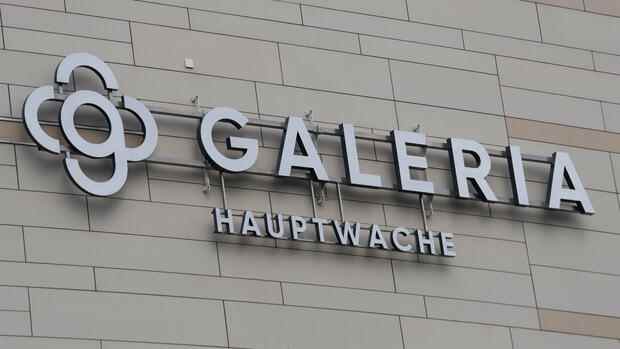The newly designed Galeria at the Hauptwache in Frankfurt.
(Photo: dpa)
Dusseldorf, Berlin In view of the high losses of the department store group Galeria Karstadt Kaufhof, voices in politics and business are becoming louder, warning of another government loan. “It cannot be that the state supports the business model of a troubled department store giant with tax money,” said Wolfgang Steiger, Secretary General of the Economic Council of the CDU, the Handelsblatt. And Patrick Zahn, CEO of the textile discounter Kik warns: “Here, good money is thrown after bad.”
Galeria has now admitted in a publication in the “Bundesanzeiger” that the company expects “an annual deficit in the low to mid three-digit million range” for the 2021/22 financial year, which ended at the end of September. For the 2020/21 financial year, the company had even reported a deficit of 623 million euros.
In the federal government, too, doubts are growing as to whether the Galeria business model offers future prospects. One is very skeptical as to whether there could be another state loan, according to government circles.
Galeria has already received a state loan of 680 million euros
“Those responsible in Berlin cannot guarantee that the loans can be serviced in full in this structure,” points out Timm Homann, CEO of the retail chain Ernstings Family. The state should not intervene in terms of regulatory policy either, he tells the Handelsblatt: “Because the capital resources of a company are always a differentiating feature in the competitive cut-throat competition.”
Top jobs of the day
Find the best jobs now and
be notified by email.
“I see future prospects for Galeria for a maximum of five years,” agrees Martin Fassnacht, retail expert from WHU, Otto Beisheim School of Management: “As sad as that is for the more than 16,000 employees, it has to be said clearly that the company has his future behind him.”
The big concern in politics is that there could be a public outcry if, in the worst case, Galeria with its 131 locations had to close. Expert Fassnacht, however, warns: “Politicians must not allow themselves to be blackmailed with the locations.” Galeria’s department stores do not offer the cities a forward-looking concept either.
>> Read also: Galeria Karstadt Kaufhof terminates collective agreement and probably needs “fresh money again”
In particular, the unequal treatment of companies is criticized in the economy, should Galeria be supported again. “That would be a catastrophic wrong decision,” says Kik boss Zahn. “We all have to go through the crisis – only Galeria is repeatedly enabled to take a special path.” Galeria has already received a total of 680 million euros in government loans – significantly more than any other retailer. The burdens from factors such as corona lockdowns, reluctance to buy due to inflation and the threat of recession, and rising energy costs are the same or at least similar.
“Many smaller companies with a comparable range do not receive any support,” says Jost Wiebelhaus, owner of the sports retailer Frankfurter Laufshop. “They secure jobs in the cities with good ideas and their own money and are thus punished for it by politicians,” he complains. The variety of small shops is the real magnet for the inner cities and no longer the big department store.
Competitors complain about distortion of competition
Heinrich Quast, owner of a department store for fashion and toys in Lower Saxony, also fears a “considerable distortion of competition” if Galeria receives state support again. Galeria has already received massive support twice, and the suppliers and employees have also made enormous contributions to the protective shield process. That is why substantial restructuring contributions from the owner René Benko and his Signa Holding are now required.
The General Secretary of the CDU Economic Council also takes this line. “We are hearing from our membership these days that many of the owner-managed retailers in particular have liquidated their reserves and poured them into their life’s work, which has often been built up over generations, in order to save it,” reports Steiger. “We have not been able to observe this with said department store giant.”
“It is unacceptable that the Karstadt owner has already outsourced his high-priced department store properties, often in the best inner-city locations, in order to protect his personal assets,” emphasizes Steiger. At the same time, all taxpayers – and thus indirectly also the medium-sized competitor – should be liable for their operative business, he criticizes. “The big ones get the liquidity booster, the medium-sized companies get nothing – that shouldn’t be the answer of the Federal Minister for Economic Affairs,” said Steiger.
>> Read here: Guest comment – Homo oeconomicus: Not again subsidies for the billionaire Galeria owner René Benko
In fact, the properties of Kaufhof and Karstadt have now been spun off into separate companies. However, Benko has already provided the company with amounts in the hundreds of millions on several occasions. As part of Galeria’s protective shield proceedings, he last contributed 366 million euros through his Signa Holding two years ago. As with previous figures, however, some of this was granted as a loan, which makes it difficult to understand how much he has actually invested on balance.
Especially since the owner has also approved distributions. Galeria Properties, which holds all the shares in Galeria Holding, distributed a good 450 million euros to Signa in the 2020 financial year. Spicy: This distribution was published in the “Bundesanzeiger” exactly two days after the second state loan of 220 million had been approved in January 2022.
More: WArena house group Galeria admits “existence-threatening emergency”.
